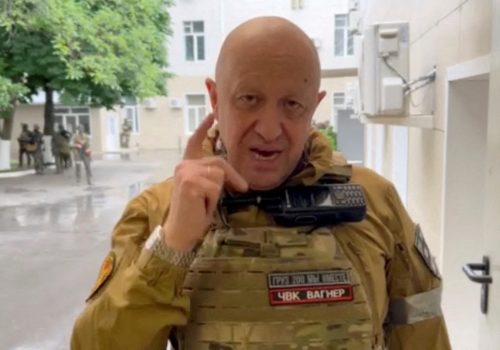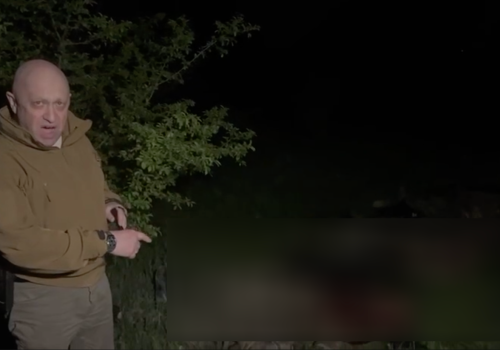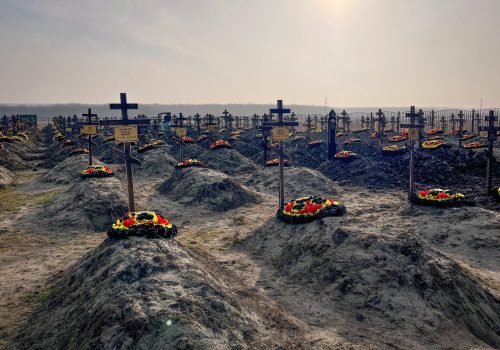Putin is losing control of Russia
This article was updated on June 24 to reflect the deal between Wagner Group forces and the Russian government.
Over the past forty-eight hours, the news out of Russia has been riveting. Yevgeniy Prigozhin, leader of the Wagner group of mercenaries, announced that the Russian military bombed his troops’ camps in Ukraine and that he would march with his troops for a reckoning with Russian Defense Minister Sergei Shoigu. As armored cars appeared on the streets of Moscow, Wagner forces took control of the city of Rostov-on-Don, a major logistics hub for the war on Ukraine, and sent a column toward the capital. The Federal Security Service (FSB) indicted Prigozhin for instigating an armed rebellion, and Russian President Vladimir Putin delivered a speech labeling Prigozhin’s actions as treasonous (without using his name) and claimed that all of the resources of the government would be used to end this threat to the nation. Prigozhin meanwhile issued a statement that stressed his quarrel was with Shoigu and did not mention Putin.
Then just as suddenly, Prigozhin called off his advance and withdrew, saying that he wanted to avoid Russian bloodshed and that this had always been part of the plan. But then Belarusian dictator Alyaksandr Lukashenka negotiated a settlement with Prigozhin on behalf of Putin that, according to Putin spokesman Dmitry Peskov, led Prigozhin to send his troops back from the approach to Moscow and from Rostov-on-Don to their base. The settlement involved the Russian government dropping its criminal charges against Prigozhin and allowed him to depart peacefully to Belarus.
What does all this mean? This crisis has been building since last fall, when in the wake of Ukraine’s successful counteroffensive, Prigozhin began to criticize publicly both Shoigu and General Valery Gerasimov, chief of the General Staff, for their failures on the battlefield and also for not sending Wagner the weapons and supplies necessary to conduct operations. Last year at times, Chechen leader Ramzan Kadyrov would join Prigozhin in criticizing Shoigu and Gerasimov. Earlier this month, it appeared that Prigozhin would be reined in as all private defense company soldiers were ordered to sign contracts with the Ministry of Defense, which would mean that Prigozhin’s mercenaries would actually be paid for and under the control of the Ministry of Defense. While the stated deadline was announced as July 1, Prigozhin loudly refused to do so. It may well be that he struck now because he saw that deadline as a danger to his control of his troops.
Of course, all the resources at the ostensible command of Putin—the army and air force, Rosgvardiya (the presidential guard), and the FSB—greatly overmatch Wagner. But Prigozhin’s forces in Ukraine were notably more effective than the army in Ukraine and were widely seen as responsible for the few victories Moscow has achieved since Ukraine’s 2022 counteroffensive. So, he has a standing in Russia not matched by Shoigu or any army commander. Prigozhin has also enjoyed a reputation for taking better care of his troops than the army does. These things are important because Prigozhin, like Putin, is appealing to the loyalty of the soldiers on the other side. There are reports that the forty-fifth airborne brigade and other Russian units refused to leave their barracks to stop Wagner. In short, Putin could not be sure that an order to crack down on Wagner would be carried out successfully. This was true despite the fact Kadyrov said that his Chechens would stop Wagner and some of his forces were apparently en route to Rostov-on-Don before Prigozhin stood down. But this is a double-edged development as Kadyrov is despised by the FSB and the Ministry of Interior. They do not want to see Kadyrov’s position in Russia strengthened.
All this is not the picture of a strongman in full control of his country’s politics or his own fate.
So, what is the meaning of this high-stakes melodrama? Most analysts have been saying even recently that Putin’s control in Russia was rock solid. That Prigozhin got this far demonstrates something rather different. Despite the incessant efforts of the Russian media, the Russian elite has long understood that Putin’s big invasion of Ukraine has been a disaster. In his frequent criticism of Shoigu and Gerasimov over the past nine months, Prigozhin has also spoken about the overall problems in Russia’s war on Ukraine and suggested that perhaps it was a mistake.
It is true that the denouement seems to remove Prigozhin as a not quite controllable player on Moscow’s political field. His feud with the military and increasingly loud criticism of both the conduct of the war and the decision to launch the big invasion now seem a thing of the past—a clear gain for the Kremlin. At the same time, Prigozhin challenged Putin and elicited a threat to punish him for treason, but then Putin let him walk away unscathed. All this is not the picture of a strongman in full control of his country’s politics or his own fate.
There is some speculation now that in Belarus Prigozhin should stay away from windows in multistory buildings and watch carefully what he ingests. And yes, Putin could easily reach Prigozhin in Belarus. But that too would make the Russian dictator look dishonorable and weak. Nor would it remove the impression that Putin was unable by force to stop Prigozhin’s marching troops, who were greeted as heroes in Rostov-on-Don. Those images cannot be erased.
While Putin did not have to divert significant resources from the war on Ukraine to deal with the Prigozhin challenge, the turmoil certainly hindered planning at the Wagner-occupied headquarters in Rostov-on-Don. It also sent a clear signal of unsteady leadership to the already demoralized Russian troops in Ukraine. This can only help Ukrainian forces as they continue their counter-offensive.
John Herbst is the senior director of the Atlantic Council’s Eurasia Center and former US ambassador to Ukraine.
Further reading
Sat, Jun 24, 2023
Russian War Report Special Edition: Prigozhin and Wagner forces mutiny against Moscow
New Atlanticist By
A special edition of the Russian War Report on Wagner Group's mutiny against the Russian military and occupation of Rostov.
Fri, May 5, 2023
Russian War Report: Prigozhin threatens Wagner withdrawal from Bakhmut
New Atlanticist By
Wagner Group leader Yevgeny Prigozhin threatened to withdraw forces from Bakhmut following conflict with Russian military leadership over resources.
Tue, Apr 4, 2023
Russia’s Wagner Group is a feature not a bug of the Putin regime
UkraineAlert By
Russian private paramilitaries like the Wagner Group are a symptom of the institutionalized corruption at the heart of Putin’s regime and not just another instrument in Russia’s hybrid warfare toolbox, writes Allen Maggard.
Image: Russian President Vladimir Putin gives a televised address in Moscow, Russia, June 24, 2023.


